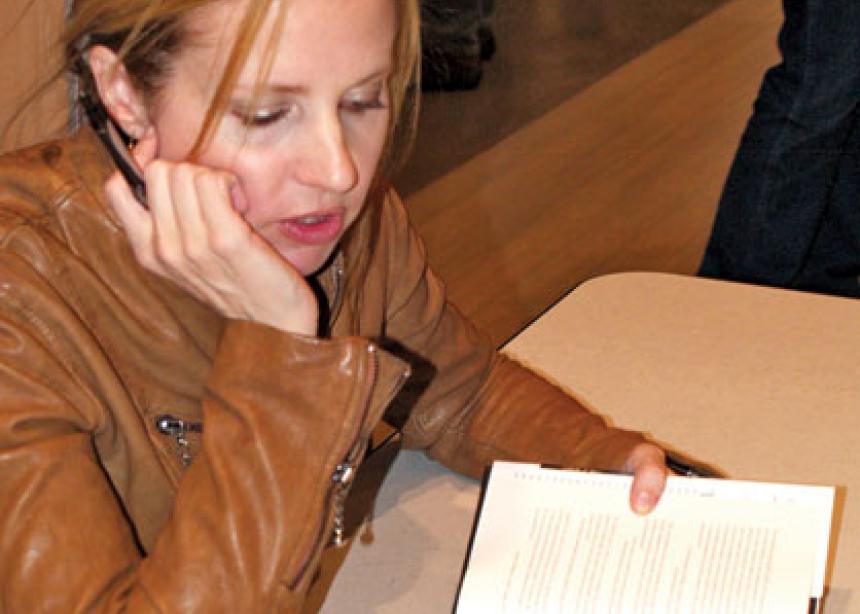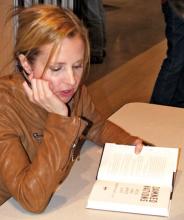The greatest threat to world peace today is the Kalashnikov AK-47 rifle, Samantha Nutt told an engaged audience who had come out on Feb. 27 to celebrate 35 years of Project Ploughshares’ work at building lasting peace.
But the co-founder of War Child, an international agency assisting war-affected children and women, had high praise for Project Ploughshares because of its persistent efforts at educating the public on the arms trade and working through research and negotiations with the UN and the Canadian government, a major buyer of small weapons, along with Germany and “five members of the Security Council. These countries represent 70 percent of the sales,” she said.
It is organizations like Project Ploughshares that will bring new awareness to the public mind, she said, with “an uncompromising and commanding voice on nuclear disarmament and arms control for 35 years, that rightly measures success in terms of policy impact. The organization assesses its progress in relation to its overall goal of disarmament, rather than to an arbitrary cost-per-capita metric.”
Nutt praised Project Ploughshares, co-founded by Ernie Regehr as a part of Conrad Grebel University College’s peace program, for “not ceding to political interests and able to sustain itself without government funding.”
The 42-year-old humanitarian activist, slight of build but packing a rhetorical punch, spoke of her experience working in and out of war-ravaged countries like Somalia and the eastern region of the Democratic Republic of Congo, the latter of which she described as the “most dangerous place on the globe for a woman to live.”
She rattled off the alarming statistics from the World Bank that lists the worldwide number of AK-47s, including those with grenade launchers, at some one billion. The lightweight rifle is easy to use and capable of firing 600 rounds of ammunition a minute. The tragedy is that many of these are put into the hands of child soldiers who perpetrate violence on a grand scale.
“Globally we spend more than twice as much on these weapons as on all the humanitarian and health aid combined,” she lamented. “Sales are at $400 billion a year, a 60 percent increase since 9/11.” The pathos is that, combined with raping and killing by teenage members of gangs, these weapons of war are more readily available in these African countries than “pure drinking water.”
She told a gut-wrenching story of a 13-year-old on her way out of a village to buy food being gang-raped and then disfigured by a roving band of three teenage boys, who left her bleeding by the side of the road. Rape, which ruins the chance of marriage for young women in that culture, is pandemic despite the presence of some 5,000 UN peacekeepers and the fact that rape as a weapon of war is a crime under international law.
These tactics are so entrenched, she said, because of centuries of exploitation, beginning with the slave trade and continuing on through colonization, the ethnic division and the influx of millions of refugees from Rwanda and elsewhere. Right now, she said, the conflict is centred on who will control Congo’s natural resources, especially coltan, a black tar-like mineral that is a vital component used in a vast array of small electronic devices, especially in mobile phones, laptop computers and pagers.
Congo possesses 80 percent of the world’s coltan. In her studies, Nutt has found a direct link between sexual abuse and mining operations, saying the lawlessness is much more prevalent in the vicinity of the mines than in other parts of the country.
All of this points to the fact that the western world is largely unaware of these
causes of deep-seated and ongoing conflicts because of its sanitized view of global conflicts. Critical of volunteer tours mass-marketed to the more exotic places in Africa, she bluntly calls many westerners in her book Damned Nations: Greed, Guns, Armies & Aid, an “odd combination of gawkers and do-gooders, proselytizers and community groups, who’d been unable to resist the urge to do something.”
Building a lasting peace
Project Ploughshares praised for persistent efforts at disarmament
March 14, 2012 | God at work in the World | Number 6
Story and Photo by Dick Benner | Editor/Publisher
Waterloo, Ont.
Samantha Nutt signs copies of her book Damned Nations: Greed, Guns, Armies & Aid at the Project Ploughshares 35th-anniversary celebration in Waterloo, Ont., last month.



Add new comment
Canadian Mennonite invites comments and encourages constructive discussion about our content. Actual full names (first and last) are required. Comments are moderated and may be edited. They will not appear online until approved and will be posted during business hours. Some comments may be reproduced in print.